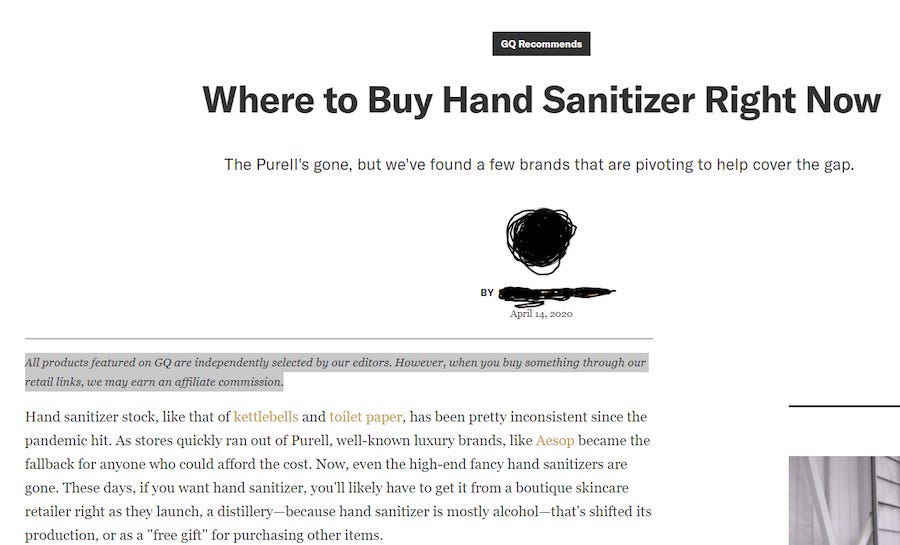Is Selling Hand Sanitizer Online Rock Bottom For Digital Media? Probably Not

For the past few years a big part of every digital media outlet's income has come from affiliate links (usually from Amazon). How these work is that a company writes a post about a list of products and posts links to where can buy said products in the story from an online seller like Amazon. If a reader clicks on the product from the story and then buys the product on Amazon from that click-through, the publication gets a little cut of the money.
Sometimes publications, like the New York Times' Wirecutter, do this under the guise of "objective journalism," saying some boilerplate about how the writers reviewing the products don't know how much money they're making for their site by putting certain products over others or whatever. Sure. Other sites make no attempt to perform this song and dance, and still others just do outright sponsored content that also involves referral links.
Regardless of the situation, however, affiliate links have been both a gift and a curse for the ever-struggling digital media industry. On one hand, they can be incredibly lucrative. On the other hand, they once again shackle the financial and editorial future of a publication to the whims of a massive data-mining syndicate, in this case Amazon. Earlier this week, the company announced that it'd be cutting affiliate link commissions to sites on April 21, shrinking the cut that media companies get to as little as 1 percent in certain markets. An Amazon spokesperson gave CNBC a "no comment" when asked whether this change was a result of the coronavirus panic.
The coronavirus panic has led to many things of course, including a dire shortage of hand sanitizer in most stores around the country. In some cases, it's still available to buy online, which has led us to this: companies running affiliate-link articles of luxury brand hand sanitizer to capitalize on the shortage and the last few days of the good Amazon margins before things get tighter next week.
Here's GQ: Where to Buy Hand Sanitizer Right Now
The "where," of course, is "online, through the link we have provided to you and which gives us money if you click on it." The actual seller, however, is interesting. We have $8 grapefruit hand sanitizer in a reusable 8 ounce aluminum bottle by a brand called "Humankind." (I'm not going to be linking to any of these offerings in this blog because, shockingly, none of them are paying me for it. If anyone with the power to make decisions at a brand is reading this blog, however, feel free to shoot me an email about possible sponsorship or affiliate link opportunities at Discourse.blog.)
We also have a $16, 6 ounce bottle of "hand sanitizing spray" by Vegamore, and my personal favorite, a $20 bottle of craft-distilled hand sanitizer made by King's County Distillery, a small craft distillery in the Brooklyn Navy Yard that makes a really nice bottle of bourbon, in my opinion, but which is now distilling pure ethanol in order to help their own business stay afloat and alleviate NYC's massive shortage in PPE and medical supplies. You can actually buy the bottle from the distillery for $1 because they're selling it for no profit on a donation basis, but its better for the small business if you donate a full $20 -- which is also better for GQ if you do that through their affiliate link!
The point of this blog is not to single out GQ, largely because someday down the road I might try to pitch an article to GQ and feel the need to soften this blow a little bit in case an editor there is reading this blog and thinks I'm being "mean." But also, other outlets are doing the exact same thing: here's almost the exact same article on People, USA Today, Tom's Guide, and Refinery 29 (republished by Yahoo Finance). There's a ton more if you just google "buy hand sanitizer online," a search term that saw a massive peak in the middle of March. Unless your hand sanitizer piece was up around then, you're behind the curve! USA Today has already moved on to hawking thermometers.
There's an argument to be made here that these articles serve the public good, like any other review or list of products. Sites like Wirecutter (with its stated commitment to objectivity) can be incredibly useful for making all the little decisions of consumption that daily life now requires. Before the GQ piece popped up in my Twitter feed, I actually didn't know that King's County was one of the distilleries re-purposing its stills to make sanitizer. But if you want to get metaphorical about it, the desperation inherent in any of these posts is also one of the clearest signs of just how sick this industry is -- and makes it particularly obvious that the rest of the world is dying from the same disease.
Screenshot: GQ.com




